- Home
- Neal Stephenson
Zodiac Page 8
Zodiac Read online
Page 8
One of the New York City remote crews drifted by in their van, reminding me: we’ve got a media apocalypse to run tomorrow, and these guys don’t even know it yet.
For that matter, neither did the victims. They’d been waiting for us to arrive for a month. Today we’d created a big noise and made them look like jerks. Now they were sitting back, holding meetings with their PR flacks, getting started on the damage control. That was awful, they were thinking, but now it’s over, and we can stop the bleeding and pour some more death into the oceans.
Hardey-har-har. Tomorrow they’d need both hands just to hold their intestines in place. But we had to prep the media.
“Sangamon Taylor? Quite a show. Were you involved?”
This was one of the local media types, a classic horse’s-ass TV reporter with a pneumatic haircut. He was winking at me, assuming that I was the man in the moon suit.
“Wait until tomorrow,” I said. “Then we’ll have some great visuals for you.”
“You’re doing something else tomorrow?”
“Yeah. Not one of these media events, you understand. I mean, what we did today, I’m sure you can see that it was intended just to look kind of flashy on TV. No real news value.”
Shock flashed over his face like a blue beam from a cop car, then he managed a grin. “I gathered that,” he said, a few tones higher than his baseline anchortone. “You did a good job of it.”
“Thanks, but I’m sure a journalist like you can understand there’s more to GEE than just a bunch of clowns waving at the camera. We do serious work, too. Stuff that’ll make for a real story—not just a piece of fluff.”
What could I lose? His piece of fluff was already cued up in a videotape machine at the station.
“Tomorrow?”
“Yeah. We’ll start real early in the morning, but this is going to be a long operation. All day long.”
“Where?”
I told him how to get to Blue Kills Beach and gave him a xeroxed handout we prepared for the Fourth Estate—tips on how to protect and use your camera on a rocking Zodiac and that sort of thing. I also tossed him a videotape, stock footage of GEE frogmen working off of Zodiacs, plugging pipes.
“Thanks,” he said, “I’ll copy this and get it back to you.”
“Keep it. We’ve got others.”
“Oh, thanks!” He hefted the videotape and did a doubletake on it. “Jesus! This is three-quarter inch!” Then he gave me a sly wink and promised to see me tomorrow.
In the Omni, Debbie was on the phone to a reporter who’d been sent here from one of the New York papers. He’d be more portable than a minicam crew, shrewder, harder to manipulate and a lot more fun to hang out with.
We and the reporter—a round grizzled type named Fisk—and the Blowfish and the truck from the hardware store and a Lincoln with two rent-a-dicks all converged on Blue Kills Beach. I considered trying to hide our purchases from the dicks, but even if they saw what we had, they’d never anticipate our plan.
The driver from the hardware store was severely rattled. He was just a sixteen-year-old, probably doing his part-time on his way to being an artillery loader at Fort Dix. His dad probably worked at the plant. He’d never seen men with hair before.
“You know anything about outboards?” I asked him by way of male bonding. We got into a long rap about whether I needed to check the carburetor on one of our Mercs. Artemis got involved and soon the kid relaxed completely. He allowed as how he’d never seen such big motors on such small boats and she took him for a ride while we unloaded the truck. When he came back, half drenched with salt water, phthalates and hydrazines, he thought we were pretty cool. And that’s fine, because we were pretty cool—Artemis is, anyway—and it wouldn’t be fair for him to go away with the wrong impression. We take people for rides while the chemical companies lay off their cancerous dads, and sooner or later they decide on their own who the good guys are.
Several of the Blowfish crew wanted to do laundry and bathe in real tubs, so Debbie and I handed over the keys to the Omni and the honeymoon suite, after I talked to them briefly about dipsticks and redlines. Then we headed out to sea on the Blowfish.
I sat down on the foredeck with Fisk, who accepted one of my illegal cigars. We smoked and drank beer and traded environmental stories for a bit, then I showed him the pictures of the theta-holes, sketched the diffuser, laid out the whole gig.
He was interested, but not overly. “I figured you had something big planned,” he said, “but my main reason for coming was this.”
“What?”
“This,” he said, and swept his arms out wide. Then I noticed that we were sprawling on the deck of one very fine handmade wooden ketch, on the open ocean, under a golden afternoon sky, cooled by the breeze and warmed by the sun, sailing along strongly and quietly, smoking fine Cuban cigars.
“Oh, yeah,” I said. “Fringe benefit.”
Over dinner it came out that this was Captain Jim’s birthday. Tanya had brought out some kind of politically incorrect cake, buried an inch deep in frosting, with a crude picture of a ketch on top. Debbie took the opportunity to give him something she’d been meaning to give him anyway.
She’d put in a lot of time on banner duty. More time than anyone should. She had a knack for visual thinking, Debbie did, and we knew it. These days she just sketched them out and canvassers—our student gnomes—did the sewing. One of her better efforts was a big square banner that we shackled to the top of a Fotex water tower one fragrant spring evening. It was simple: a skull and crossbones with the international circle/slash drawn over it in red.
Given the same assignment, I would have written a twenty-five word manifesto with a little picture down in the corner. Debbie said the same thing with a picture. I was impressed. When drunk, I referred to it as the Toxic Jolly Roger. The next time I went down to my Zodiac, someone had been there and attached a little fiberglass pole to the transom, a segment of a fishing rod. A little hand-sewn nylon flag was flying from it: black, with the skull and crossbones in white and the circle/slash in red. That was when I knew this woman liked me.
Then she came up with the idea of making a big one for the Blowfish. For some reason, I had to help, so we went to fabric stores and I loitered among the heavy, manly fabrics in the canvas section and scared off business while she charged up yards of ripstop nylon on a credit card that turned out to be mine. Then we laid it all out on the floor of her living room and drew the patterns. She had to educate me in basic cloth facts: if you draw the pattern on a chunk of cloth that is stretched out of shape, the pattern will be messed up. Then we had to seal the edges against fraying by running them through a candle flame, filling the apartment with every toxic fume known to man; I could feel the dissolved brain cells dribbling out my ears. Debbie insisted that no operation connected with sewing could really be toxic. And finally we ran it through her fucking Singer. I just went to the other room and watched the static from the sewing machine tear across the screen of her television. I don’t like sewing machines. I don’t understand how a needle with a thread going through the tip of it can interlock the thread by jamming itself into a little goddamn spool. It’s contrary to nature and it irritates me.
So when we presented it to Jim, everyone applauded Debbie, and I just sat there like a turd on a platter. Then it was time for boy stuff. I cranked on the ship’s generator and started ripping open boxes.
We drilled holes in bowls until 11 P.M., when I went to sleep. Debbie and I crammed ourselves into a berth meant for one. That was okay, since today was our first time. But in a week or so we’d need a kingsize waterbed. Fisk hung out on the deck in a sleeping bag, drinking brandy and making Artemis laugh. Jim just curled up next to the tiller, looking at the stars and thinking about whatever a forty-five-year-old sea drifter thinks about. The Atlantic rocked us to sleep, even as it was killing some more dolphins. The Toxic Jolly Roger grinned down over one and all.
And I woke up in the middle of the night sweating and pan
ting like a pesticide victim, Dolmacher’s slack skull-face staring at me. It’s the Holy Grail, as far as you’re concerned.
“What are you thinking about?” Debbie asked.
I hate that fucking question. Didn’t answer.
Up there, a couple hundred miles north of us, Dolmacher was up—I knew he was still awake, still at the lab at two in the morning—tinkering around with genes. Looking for the Holy Grail.
I’d never play with genes. Wouldn’t touch them. Any molecule more complicated than ethanol is too scary for me; bigger than that and you never know what they’ll do. But Dolmacher was fucking with them. And the thing of it was: I always got higher scores on exams than him. I’m smarter than Dolmacher.
10
That was the last sleep I got for about twenty-four hours. At four in the morning, I got up, destroyed the rest of the cake and chased it down with two cans of Jolt. Got a scuba outfit all ready, tromped around on top of the boat to get people awake and moving, then got into the best Zode with Artemis and we took off. At the last minute Fisk woke up and joined us.
The rent-a-dicks were lurking nearby in an open boat. There was no need for stealth, so we just warmed up the Mercury and let them eat our wake. We were quickly out of sight, and it’s hard to track by sound when your own motor is blatting away ten feet behind you. Headed north, just to give them the wrong idea, then doubled back and homed in on the end of the diffuser.
I can dive if I have to, but it’s not my thing. This time we needed lots of divers, though, and in any case the principle had to be tested. Arty saved me from certain embarrassment and possible demise by pointing out that I’d hooked up my tubes wrong. As we got them fixed, Fisk winked at me. “From here on out,” he said, “I’m an objective journalist, sort of.”
“Funny you should say that, since I’m about to commit a criminal act. Sort of.” And I fell off the Zodiac.
After a certain amount of aimless swimming around, I located the diffuser. It wasn’t putting much out right now, so I couldn’t follow the black cloud. And Tom was right, the current was powerful, and a greenhorn like me would end up in Newark if he didn’t keep swimming south.
But I had some big old magnets, things that would grip with a force of a hundred pounds, and I’d brought one along. Once I found the diffuser, I slapped the magnet on and tied myself to that with some rock-climbing webbing. This way I could plant my flippers and lean back against the tug of the rope while I worked.
From here on in it was just a problem of industrial engineering. How many holes could we plug per diver per hour, and how could we make it go faster? The key was to assemble the bowl/gasket/bolt/wingnut contraptions in the Zodiacs and hand them to the divers as they were needed.
The plug fit better than I deserved. There would be some leakage owing to the curvature of the pipe, but the diffuser’s ability to emit toxic substances would be cut down to a thousandth of the norm. It was easy to hook the curved end of the bolt under the crossbar and twirl the wingnut down to tighten it. I took my time and estimated how far we could pretighten the wingnuts in the Zodiacs so that the divers wouldn’t have to spend cumulative hours twisting them down.
Then I smeared some pipe cement over the threads. Hopefully it would harden up and prevent the wingnuts from being removed.
Not bad. I pretightened the wingnut on another assembly, checked my watch, swam to the next hole, and plugged it. That took five minutes. Five minutes per hole meant five hundred diver-minutes. They’d spend half their time farting around with air tanks and other friction, so we needed a thousand diver-minutes, or something like sixteen diver-hours. If we wanted to do it in four hours, we’d need four divers.
When I broke the water, our objective journalist was in a truly passionate clinch with Artemis. His fault. I’d made a point of waving my light around to warn them. When making love to granola commandos, leave your eyes open. They broke apart and I pretended to be looking the other way.
“I’m in luck,” I said. “We only need four divers. And we happen to have four, besides me—so I can stay on top. Where I belong.”
Artemis dunked me for that. Then we went back to the Blowfish, which blazed with light and cast a heavenly garlic smell across the water. Jim was up cooking—it had to be Jim, whose passion for garlic was fine by me.
“I’m not trying to sound, like, militaristic,” I announced to the tofu-eating multitude, “but we have a go, Houston.”
Everyone said “all right” and some raised an herbal toast. Now that these people were used to me, they were getting into the project. The prospect of destroying a mile-long toxic waste diffuser—hell, destroying anything a mile long—was a fiendish temptation.
“You want to call the plant, then?” Jim asked.
“I figure, as soon as we’re done eating, we go over there and start. We’ve got two divers here and two at the TraveLodge and they’ll be meeting us in half an hour. So once we get it working smoothly, get all those initial bugs worked out—”
“The part of the operation where we look like assholes,” Debbie said, translating.
“—correct, we shut down the plant. That’ll take about thirty seconds on the phone. Then we start the carnival.” With Fisk present, I wasn’t going to get any more explicit than that.
It all went pretty well, except that Fisk suddenly admitted, when the Blowfish was halfway there, that he had a gram of coke in his photographer’s vest. He decided to fess up when he noticed that we all went through one another’s clothing, looking for anything that could be construed as a drug or weapon; for obvious reasons we always did this when we were likely to get busted. And once Fisk owned up, I felt guilty and admitted to a square of blotter acid in my wallet which, since it was on a Boston Public Library card I didn’t think would ever be noticed. But guilt is guilt.
LSD is a violation of Sangamon’s Principle. It’s a complicated molecule and hence makes me nervous. But sometimes you get in situations so awful, or so physically taxing, that nothing else will penetrate.
So the library card was burned, its ashes scattered, and Fisk’s coke went up certain noses. We attacked our task with renewed vigor.
The TraveLodge people showed up a little late and we hustled them off to work. I hung out on shore, watching the media and authorities gather. They took pictures of me inflating a child’s large wading pool. Hard to look like a commando when you’re doing that; we’d have to get us a pump.
I have to get the toxics off the bottom of the sea and onto the cathode-ray tubes of the public in order for this kind of gig to work and, because the diffuser was completely hidden, this wouldn’t be easy. All we had to show was a bunch of scuba divers jumping into the water with salad bowls and toilet parts and coming back up without them. So about the time all our media were in place, I took a Zode out and borrowed Tom from the salad-bowl operation. We went out to the Blowfish, picked up a portable pump and motored back in toward shore. Tom swam down to the diffuser and put the pump’s intake hose into a diffuser hole, and I hauled the Zode up onto the beach and dragged the pump’s output hose into the wading pool. Minicams clustered like flies on a muffin. I’d chosen a pool with a nice bright yellow bottom, so the Swiss Bastards’ black sludge hit it with a nice mediapathic splash.
We ran the pump until the pool was nearly full. Along with Zodiacs and moonsuits, wading pools are among my favorite tools. We were lucky here, because the waste looked really bad. Sometimes you get stuff that’s clear as water, and it’s hard to convince people that it’s really just as dangerous. After the pool, we also filled a couple of 55-gallon drums—these we’d chain to the doors of the New Jersey Statehouse in a couple of days—and then we were all done with the pump. I went over to the Omni and picked up the phone.
Every large corporation has its own telephone maze, its juicy numbers and dead ends, its nickel-plated bitch queens and sugary do-gooders. I’d already navigated this particular maze from Boston on my WATS line. So I dialed a particular extension three or four tim
es, until I got the receptionist I wanted, and she punched me through to the plant manager.
“Yes?” he said, kind of groggy. I checked the Omni’s clock. It was only 8:30.
“Yes, this is Sangamon Taylor from GEE International. How are you today?”
“What do you want?”
“I’m fine, thanks. Uh, we’ve discovered a big pipe sticking out into the ocean that’s putting very large amounts of hazardous wastes right into the water. In fact, of the six pollutants that had EPA has licensed you to discharge into the water at this point, you’re exceeding the legal limit on all six. And since they’re very dangerous substances, what you’re doing is illegally endangering the health and welfare of everyone who lives in this region, which is a lot of people. So, uh, we’re shutting the diffuser off now, and I’d recommend that you stop putting wastes into it, for obvious reasons. If you’d like to get in touch with us, we’re down at Blue Kills Beach. Would you like to take down our phone number here?”
“Listen, buddy, if you think that’s just some little old pipe, you’re wrong.”
So I gave him a complete description of the pipe and what we were doing to plug it.
By this time the Omni’s window had become kind of a TV screen for all the media to watch. I rolled the window down and turned the phone over to the “speaker” setting so that they could hear the whole conversation. On the whole, it was calm and professional, no fireworks. I go out of my way to be polite, and people entrusted with running huge chemical plants, unlike some of their bosses, tend to be in control of themselves. One techie to another. It’s the flacks and executives who fly off the handle, because they have no understanding of chemistry. They don’t imagine they might be wrong.

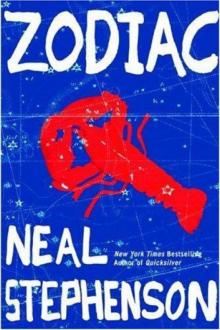 Zodiac: The Eco-Thriller
Zodiac: The Eco-Thriller The Mongoliad: Book One
The Mongoliad: Book One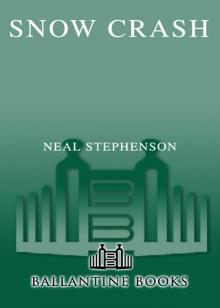 Snow Crash
Snow Crash The Confusion: Volume Two of the Baroque Cycle
The Confusion: Volume Two of the Baroque Cycle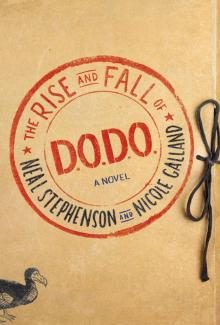 The Rise and Fall of D.O.D.O.
The Rise and Fall of D.O.D.O.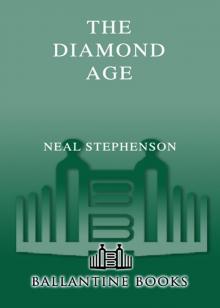 The Diamond Age: Or, a Young Lady's Illustrated Primer
The Diamond Age: Or, a Young Lady's Illustrated Primer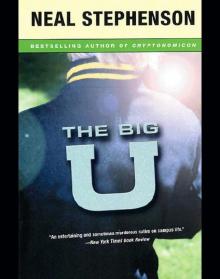 The Big U
The Big U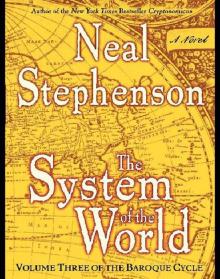 The System of the World: Volume Three of the Baroque Cycle
The System of the World: Volume Three of the Baroque Cycle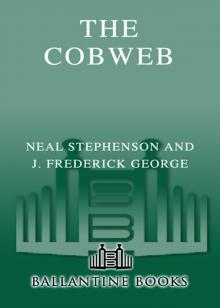 The Cobweb
The Cobweb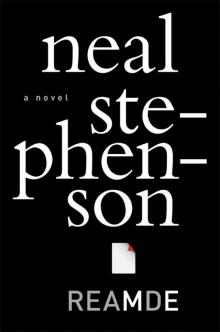 Reamde
Reamde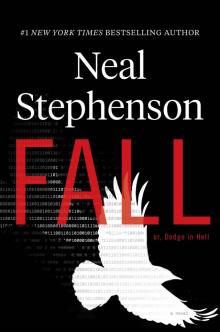 Fall; or, Dodge in Hell
Fall; or, Dodge in Hell Interface
Interface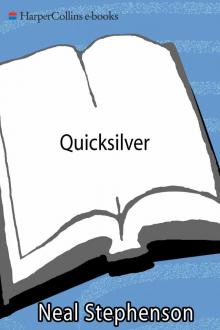 Quicksilver
Quicksilver The Mongoliad: Book Three
The Mongoliad: Book Three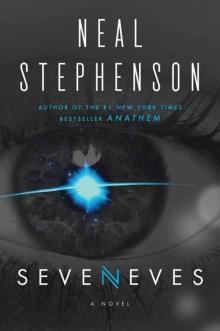 Seveneves
Seveneves Atmosphæra Incognita
Atmosphæra Incognita In the Beginning...Was the Command Line
In the Beginning...Was the Command Line Anathem
Anathem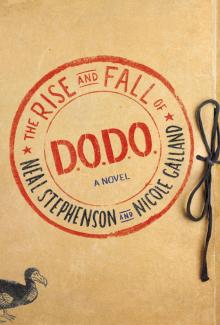 The Rise and Fall of D.O.D.O.: A Novel
The Rise and Fall of D.O.D.O.: A Novel The Mongoliad: Book Two
The Mongoliad: Book Two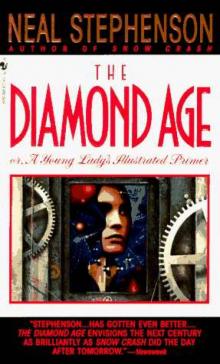 Diamond Age or a Young Lady's Illustrated Primer
Diamond Age or a Young Lady's Illustrated Primer THE System OF THE WORLD
THE System OF THE WORLD The Mongoliad: Book One tfs-1
The Mongoliad: Book One tfs-1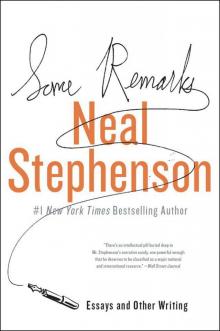 Some Remarks: Essays and Other Writing
Some Remarks: Essays and Other Writing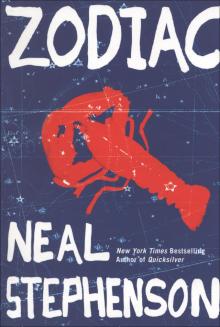 Zodiac
Zodiac Spew
Spew The Baroque Cycle: Quicksilver, the Confusion, and the System of the World
The Baroque Cycle: Quicksilver, the Confusion, and the System of the World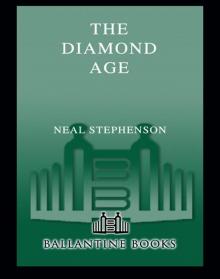 The Diamond Age
The Diamond Age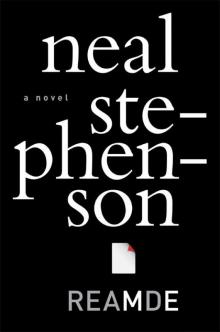 Reamde: A Novel
Reamde: A Novel In the Kingdom of Mao Bell
In the Kingdom of Mao Bell Mother Earth Mother Board
Mother Earth Mother Board Twelve Tomorrows - Visionary stories of the near future inspired by today's technologies
Twelve Tomorrows - Visionary stories of the near future inspired by today's technologies The Confusion
The Confusion The Great Simoleon Caper
The Great Simoleon Caper The Mongoliad: Book Three tfs-3
The Mongoliad: Book Three tfs-3